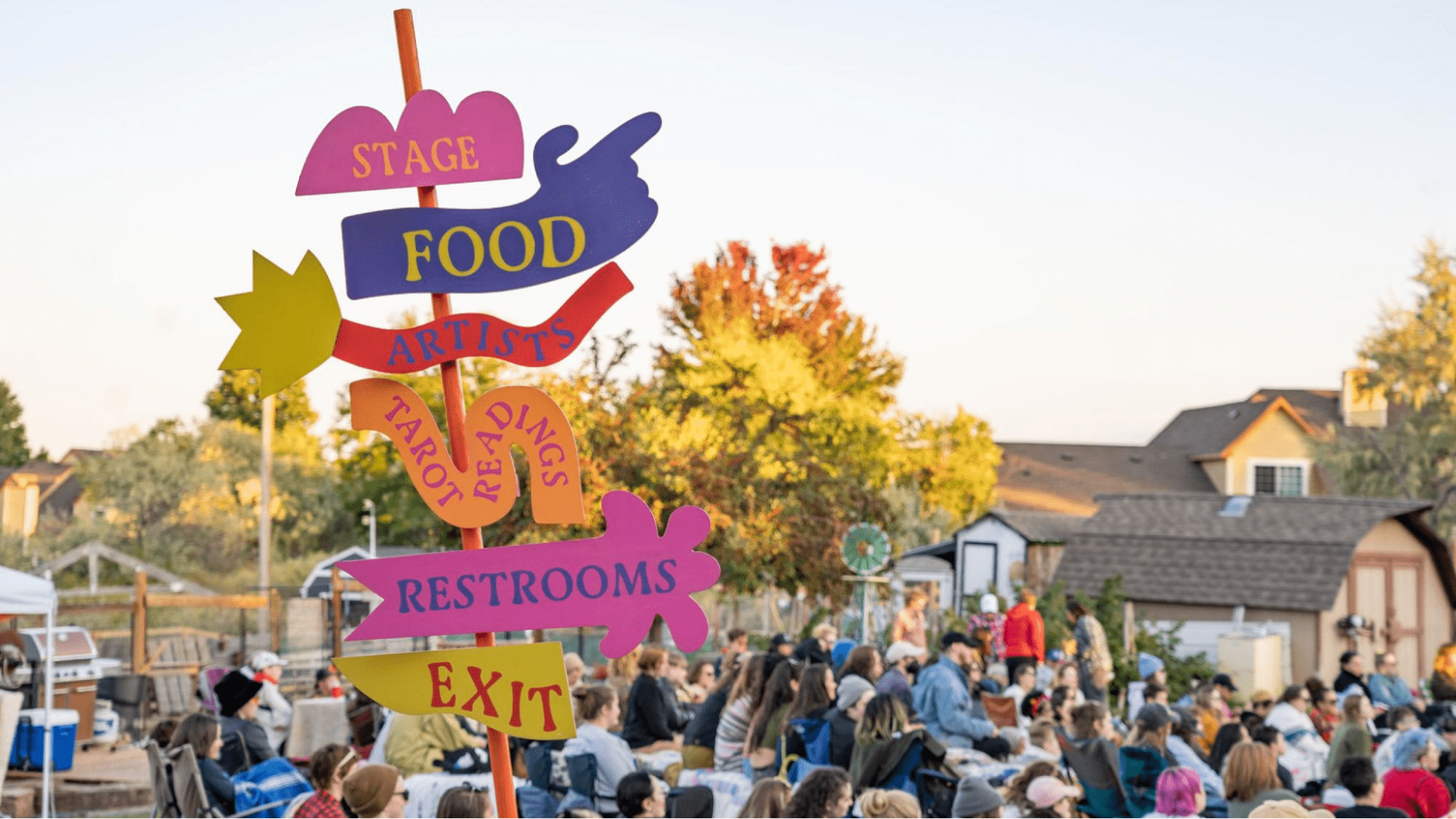The UK is home to some of the world’s biggest festivals — from Glastonbury and the Edinburgh Fringe Festival to Download, TRNSMT, the Wireless Festival, V Festival, and everything in between.
But brilliant event creators are constantly introducing their own weird and wonderful festivals every year, and we think you should, too.
Creating your own festival is a fantastic way to share your passions with others and fill gaps in the market. And although it might feel like a big jump if you’re transitioning from organising smaller events to planning your first big festival or fair, don’t stress. We’re here to help.
Here at Eventbrite, we power festivals of all shapes and sizes — from huge international events like the WOMAD Festival to smaller, regional events like the Falkirk Whisky Festival — and we want to share everything we know to help you put on your first festival, too.
That’s why we’ve created this comprehensive guide on how to start a festival. We’ll cover event organising guidelines with all of the essential information you need to host a successful festival, from setting a budget to hiring staff.

Why start a festival in 2023?
If you’ve been teetering on the fence for a while now, you should know that there’s never been a better time to start a festival.
According to Eventbrite’s 2023 Event Trends Report, 77% of UK attendees want to see more festivals happening in 2023. Bearing that in mind, it’s hardly surprising that market analysts are expecting the UK live music and festival market to reach a record high by 2026.
Starting a new festival also represents an amazing business opportunity with limitless revenue potential. According to researchers at CGA, 52% of festival goers don’t go to festivals with a set budget in mind. Festival goers are aware that prices are on the rise and ready to absorb that — but they do expect quality in return, which is what this guide is going to help you achieve.
Finally, starting a festival will enable you to build a community around your brand by creating new, meaningful experiences for your guests (which is what they want!). But most importantly, you’ll create common experiences that unite and empower communities and create repeat attendance.

How to start a festival in 10 steps
However, starting a festival requires more than just a cool idea and a business plan. To get your dream festival up and running, it’s going to take a lot of work (but it’ll be worth it!).
Read on for 10 steps for starting a festival, along with some pro tips from industry expert Sofia Genders, co-founder of the End of the Road Festival — not to mention some inspiration from real Eventbrite creators.
1. Figure out what your festival goals look like
The first step in planning a festival is to create event goals that’ll determine what success means to you — and a lot of that will depend on the type of festival or fair you’re planning.
“Having a clear vision of what you’d love your DIY festival to ultimately look like can keep you on course when unforeseen (and sometimes inevitable) obstacles crop up. It can also help you to decide what you’re willing to compromise on, and which aspects are non-negotiable,” explains Genders.
“A great way to start sourcing festival ideas is by identifying a gap in the market. What festival would you love to attend, but doesn’t exist yet? Think about your personal expertise and passions, which can help you pinpoint how you might bring value to such an event. The most unusual and niche events often bring two popular activities or themes together.”
Your goals may be qualitative, quantitative, or a bit of both.
In terms of quantitative goals, you might want to focus on ticket sales. For example, you could create a goal for your festival to sell 1,000 tickets within your first month of general sales.
According to industry analysts, the average profit margin for a UK festival is 7.8%, so setting a financial goal is likely on your mind. Based on those stats, if you invest £150,000 in organising your festival, it would be realistic to say you want your event to generate £11,700 worth of profit after all of your bills have been paid.
But you can also have more qualitative, non-monetary goals.
For example, the event creators behind Moon Rise Run simply had the goal of wanting to give attendees the unique experience of running at night in a safe and fun environment — and to eventually expand their festival to more cities across the UK.
Alternatively, you might want to set a goal based around representation. For example, booking a line-up comprised of 50:50 female to male performers. These types of qualitative goals might be important to your target audience, too.
Pro tip: No matter what types of goals you’re setting, your goals should be SMART.
A SMART goal is a goal that is:
- Specific
- Measurable
- Attainable
- Relevant
- Time-bound
SMART goals are a helpful way to set your objectives because they make it easier to see whether you’re actually achieving them.

2. Set a realistic festival budget
Festivals have a lot of different facets, so you’re going to need to include a wide range of considerations when setting up a budget for your festival.
A major cost is going to take the form of a “line item” on your festival budget. Here are some of the biggest line items you’ll likely need to include in your budget:
- Venue or location rental cost: Expect location costs of between £300 to £2,500 per day.
- Talent or entertainment cost: Costs can range from £125 for a solo performer to £15,000+ for popular acts.
- Catering and associated logical costs: Prices can range from £50 to £100 per head depending on the catering type.
- Additional facility costs: Additional costs like stage hire can range from £795 to £2,995.
- Staffing and volunteer management: Festival site crew can cost £200 to £300 per person per day.
- Equipment rentals: Costs can range from £1,200 to rent a stage screen while PA systems start from £50 for smaller events.
- Security: A security manager will generally run between £300 to £400 per day, while general security staff start from £15 per person per hour.
- Local authority permits: Local permit prices may vary, but a Temporary Events Notice (TEN) for a smaller festival or fair costs £21.
But that’s just the tip of the iceberg. Don’t forget to factor less obvious costs into your budget. For example, you’re going to devote a lot of your time to planning your festival — and your time costs money. Smaller line items might also include things like venue decorations, office supplies, shipping charges, transaction fees, web costs, and taxes.
Your budget will also better inform any goals you have around profitability, because you’ll have a better idea of how much money you need to bring in to break even.
Pro tip: If you’re setting up a festival budget, don’t start from scratch. Use an event budget template. It’ll save you loads of time and help prompt you on certain operational areas you might not have remembered to budget for.
3. Choose the perfect festival venue
“Choosing the right venue is a key part of any festival. When thinking of places to hold a music festival, consider how much space you’ll need for your desired number of attendees, plus the necessary facilities — from a bar to plenty of toilets,” says Genders.
“When establishing how to rent land for a festival, it’s essential to work closely with your logistics manager or a team member with experience working with festival sites. Make sure to meet your venue’s owner multiple times before committing to ensure a pleasant working relationship, and seek testimonials if you can.”
When shopping around, factor in each venue’s cost, capacity, and extra accommodations. For example, how many parking spots are you expecting to need? What accessibility requirements will you be expected to have on-site? Ask loads of questions from the get-go to ensure your festival venue ticks all the boxes.
This is where health and safety needs to come into play, too. Safety and accessibility points you should be looking at in the perfect festival venue include things like:
- Enough entrances and exits
- Fire doors
- Hazards like overhead power lines
- Protection from adverse weather
- Proximity to emergency services
But this isn’t an exhaustive list. The items on your health and safety wish list will vary depending on the type of event you’re planning and where you want to stage your festival.
Pro tip: Make sure you choose a venue that takes into consideration the unpredictability of British weather. For lessons on weather resilience, take a look at the Kinsale Sevens Festival and how they planned for every weather outcome.

4. Secure event funding
“Once the plans are in place for your festival, you’ll need to calculate your hosting costs to ensure it’s viable,” explains Genders.
Now you have a budget, you have a predicted cost for your event — it’s at this stage most people look for funding.
There are plenty of ways to make your project more financially feasible, from sourcing angel investors to taking out a loan. You might also consider selling advance tickets so you can start making money before your festival even starts.
As well as taking on private investors or self-funding your festival, you might be able to secure sponsorship from a company or a public body to fund part (or all) of your event. This is really common in the UK festival scene — Virgin has sponsored V Festival, Carling sponsored the Reading and Leeds Festivals, and Barclaycard sponsored both the Wireless and PST Hyde Park Festival.
There are loads of brands out there worth approaching for partial (or full) sponsorship of your event. If you’re keen to try the sponsorship route, the best place to start is by creating an event sponsorship proposal. Check out our guide for tips on how to write your proposal.
But the UK Government and a number of regional bodies even offer grants for certain types of cultural events. The UK Government’s website is a great place to start hunting, but you can also find grants on sites like ArtsHub.
Want to see how self-funding events works in practice? Take a look at these brands and event creators staging their own festivals.
Pro tip: Considering crowdfunding your festival? Platforms such as Kickstarter allow you to provide details about your event and invite potential attendees to donate and help get it off the ground. Concentrate on capturing exactly what makes your event unique, then spread the word about your Kickstarter campaign.
5. Get the right insurance and permits
It’s not the most exciting part of planning a festival, but it’s critical you’ve got all the right paperwork submitted before you welcome guests into your venue.
You might need to apply for a Temporary Event Notice (TEN) or a Premises License (liquor license). But you’ll also have to observe any noise restrictions, rules on food standards, and ISO 20121 rules on sustainability.
As you might expect, a lot of these requirements centre around event health and safety.
“More than ever, health and safety should take top priority at your event. Carry out a risk assessment to figure out what risks your festival might pose,” says Genders.
Pro tip: Don’t try to cut costs by forgoing event insurance. Most event creators setting up festivals will need public liability cover and equipment cover as a bare minimum — but there are a range of different event insurance policies designed to protect you and your business.

6. Negotiate your festival line-up
When it comes to booking your entertainment, you’ve got to start with a wish list based on your event goals and your target audience.
“The key to booking the right acts, performers, or speakers for your event is to really know your audience and invest some time into audience segmentation,” says Genders.
“Create the perfect festival line-up by doing your research and finding out which specific events have proved popular with your various segments,” Genders continues. “Consider which would fit best with the overall theme and values of your event. Having the right acts can make the difference between a mediocre event and a sell-out one.”
For example, UK music festival ArcTanGent attracts 5,000 attendees from around the world with new and underground acts. Why? Because those are the types of acts customers are expecting to see.
So, have a think about the type of festival you’re keen to put on and the people you’re expecting to buy your tickets. If you’re putting together a regional jazz festival, your line-up should center on jazz and brass bands local to your city or your part of the world. If you’re staging a breakdancing festival, your line-up will need to be composed of hip-hop and r&b acts.
Your festival line-up is going to be a huge line item on your festival budget.
If you’re unsure or don’t have much time to spare on this task, there are booking agencies and talent agencies you can commission to create shortlists and book entertainers on your behalf. This will remove some friction and free up your time, but it will represent another cost in your budget — as the agency you appoint will take a commission.
But it’s also possible to contact and hire festival acts on your own. Check out this guide for tips on how to book the perfect artist for your first festival.
Think about how you can make your event seem as appealing as possible for your chosen artists and performers. Consider supporting them in the run-up to your event by attending gigs, and sending personalised documentation of your festival vision to make a professional impression.
Pro tip: Give yourself plenty of time before your festival to negotiate appropriate fees with booking agents and managers, who will often act on behalf of the artists or speakers. Don’t underestimate the time this can take. You should start the process months in advance to allow for the signing and counter-signing of contracts.
7. Develop a festival marketing plan
After you’ve booked your line-up, it’s time to create a festival marketing plan to promote your event.
There are specialist teams and marketing agencies that you can commission to support you in creating and deploying an effective marketing plan. Just be aware that the average project cost for a UK marketing agency is over £2,400.
If you’re feeling more confident or would like to develop a marketing plan using event technology, you’re in luck. We can offer you loads of support in helping you come up with a marketing plan.
When coming up with your plan, there are a few key considerations you’ll need to include:
- Choosing the right social media channels: Make sure you’re selecting the same social channels to promote your event that your target audience is likely to be found.
- Developing a posting schedule: Develop content that will drive interest in your festival and engage your audience, and post at regular intervals to keep users warm.
- Conventional advertising: Organic posts on social media only have so much reach. Consider budgeting for paid social media ads, Google Ads, or more traditional ad space on relevant websites or publications.
- Email marketing: If you’ve already got contact information for previous customers (and their permission to use those details), email marketing is a great way to spread the word about your event to people who are likely to be interested in buying tickets.
- Press releases: Issuing festival press releases with exciting details about your event and line-up announcements is an easy way to score free publicity and drive traffic to your festival page.
- Influencers: Collaborations with influencers can be a great and cost-effective way to promote your event to a wide-reaching audience on social media.
“Your marketing and PR strategy is the best way to get the word out about your festival and a multi-channel strategy will push your event in front of as many people as possible,” says Genders.
“Consider how you can encourage engagement via social channels, using tactics like giveaways to promote sharing and likes.”
As part of your marketing strategy, you’ll need to make sure you’re optimising your event branding and campaign style so your messaging connects with the event’s target audience.
You also need to ensure you choose an event management platform that can fully support your festival promotion activity.
For example, Eventbrite enables you to sell tickets, and manage your social media ads, email marketing, and analytics all using one dashboard. This streamlines the festival marketing process so that you’re controlling and monitoring all your marketing efforts on one platform — ensuring you never miss a beat.
Pro tip: Team up with content creators and influencers to further your reach, and create useful content around your festival to which you can drive traffic. You could also explore a mutually beneficial marketing partnership with another company or sponsor, working on a shared social campaign to promote your festival.
Want to sell more tickets to your festival?


8. Recruit and coordinate event staff and volunteers
“Festival enthusiasts and volunteers can be a huge help when it comes to on-the-day festival help, such as managing queues and admission,” says Genders.
“However, for organisation and those crucial behind-the-scenes aspects, it’s worth hiring people who bring plenty of festival-specific experience with them.”
The staff vacancies you’ve got to fill will depend on the type of festival you’re organising, as well as the venue you’ve chosen. But generally speaking, you should be ready to fill roles like:
- Sales staff
- Customer service staff
- Office staff
- Medical staff
- Photographers and videographers
- IT staff
- Equipment technicians
- Cleaning staff
- Security staff
- Concession staff
Again, just remember that list is by no means exhaustive. You might need additional roles depending on the unique needs of your event.
When you begin the recruitment process, you’ll need to identify and define all the necessary roles your event will require. From there, determine which roles require paid staff and which roles volunteers could handle.
You can then advertise the positions on online job boards like Indeed, Reed, or even LinkedIn to try and find the right people.
When it comes to hiring volunteers, setting up clear communication and incentives from the get-go is essential. This will ensure that everybody’s on the same page and you only need to hire once for each role — because making a wrong hire can end up setting you back and costing you extra money.
Pro tip: Ask contacts in the industry for recommendations of trusted staff. Consider hiring highly qualified specialists to take care of health and safety, licensing, and production to help ensure your event goes without a hitch.
9. Prep your site and brief your team
After you’ve appointed staff, it’s time to start prepping your site and your new team.
That means decorating your venue, ordering and installing the appropriate signage, and getting any temporary facilities, stalls, or vendors in place for the event. This will require early access to your festival venue, so be sure to arrange it with the venue manager.
You’ll also need to conduct staff training for your volunteers and paid employees to make sure everybody’s ready to go. Your event staff are going to be the face of your festival — and so you need to arm them with all the tools they need to help make sure guests have an amazing experience.
For example, let’s say you’re working with volunteer stewards. You might want to organise a couple of short information sessions the week before the event to make sure they know where they need to be and how to address basic customer questions.
This training should include on-the-day briefings for your team, as well as any contractors you’ll be working with during the festival.
Pro tips: Aside from safety, consider all of the measures you can take to make your event as sustainable as possible.
“While planning your event, work out your environmental impact by dividing aspects into categories, such as power consumption and transport. If you’re short on time, concentrate on one key area where you might be able to reduce waste or energy use,” says Genders.
“Make clear and concise plans for how you’ll recycle rubbish on the day, and involve contractors so that everyone is on the same page.”

10. Analyse your results
After the event is over and the site’s been cleaned up, it’s time to analyse your results. Utilising an event management platform like Eventbrite, you can create custom data reports to take a look at things like your attendance to find out which festival acts were the most popular.
You can also create sales reports as a way to demonstrate your festival’s financial success to investors or sponsors. After all, better data creates better festivals.
Data analytics will enable you to provide the required measurement to understand whether you achieved your SMART goals — for example, attendance numbers or revenue.
By demonstrating your success through data, you’ll be able to optimise future events and create even better guest experiences. You’ll also be better positioned to secure funding by illustrating your proven track record using hard numbers.
As part of demonstrating this success, you should consider creating a festival report outlining all the hard numbers from your event. Cover your goals, ticket sales, conversion rates, revenues, and customer reviews and data to illustrate what went well at your event — but also what you could do to improve. This can be an invaluable tool in securing future sponsorship because it will show businesses that you’ve got a great operation.
Pro tip: One of the best ways to generate hard data about your festival and find out what your attendees thought is to set up a post-event survey. By emailing your guests with a short list of questions about what went well and what didn’t, you’ll have plenty of direct feedback that will help you create an even better event next time.
If you’re keen to use a survey, Eventbrite’s integrations with SurveyMonkey and Mailchimp make it fast and simple to create and distribute surveys to your festival attendees.
Ready to start your festival?
Starting a festival is a huge undertaking — even for an experienced event creator. But as long as you plan carefully, consider your budget, and find the right event management tools to execute your plan, you should be able to create a unique festival that your guests will love.
That’s where Eventbrite comes in. With Eventbrite, you can set up a custom event page, create a tiered ticketing system, and start promoting your festival in minutes. You can also connect with other event creators and find inspiration by exploring our community of 800,000 event creators all over the world.
So, are you ready to start planning your festival? Join Eventbrite now.





